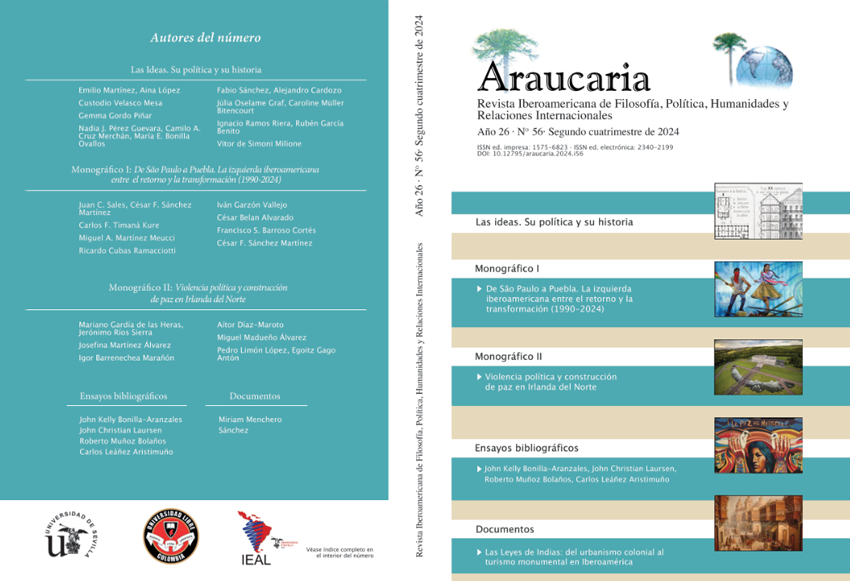Digital government and the handling of sensitive data in the execution of public policies: challenges and possibilities
Gobierno digital y el manejo de datos sensibles en la ejecución de políticas públicas: desafíos y posibilidades
DOI:
https://doi.org/10.12795/araucaria.2024.i56.06Palabras clave:
Digital Government, Public Policies, Data Protection, Big Data, Artificial IntelligenceResumen
The research aims to investigate the characteristics and risks associated with the handling of sensitive data in the implementation of public policies within the digital government model. To achieve this, a hypothetical-deductive method and bibliographic and documentary procedures are employed, proposing an interdisciplinary discussion on technological advancement, data protection, transparency, and public policies. The justification revolves around the importance of a comprehensive, cohesive system that genuinely protects sensitive personal data, considering the need to keep pace with technological developments and maintain a minimum level of security in the digital age at both national and international levels. There is no doubt that the judicious and strategic use of data has the potential to drive substantial improvements in policy evaluation, decision-making, and the relationship between government and citizens. However, dealing with personal data also means addressing risks with responsibility, transparency, and respect for individual rights.
Descargas
Citas
Bauman, Z. (2013). Vigilância Líquida: diálogos com David Lyon. Rio de Janeiro: Zahar.
Brazil. (1988). Constitution of the Federative Republic of Brazil. Retrieved from https://www.planalto.gov.br/ccivil_03/constituicao/constituicao.htm. Accessed 20 July 2023.
Brazil. (2018). Law Nº 13.709, August 14, 2018. Retrieved fromhttps://www.planalto.gov.br/ccivil_03/_ato2015-2018/2018/lei/l13709.htm. Accessed 20 July 2023.
Brazil. (2021). Law Nº 14.129, March 29, 2021. Retrieved from https://www.planalto.gov.br/ccivil_03/_ato2019-2022/2021/lei/l14129.htm. Accessed 20 July 2023.
Ferraz Júnior, T. S. (1993). Sigilo de dados: o direito à privacidade e os limites à função fiscalizadora do Estado. Revista da Faculdade de Direito, Universidade de São Paulo, 88, 439-459.
Hoffmann-Riem, W. (2022). General Theory of Digital Law: Challenges for the Law. Rio de Janeiro: Forense.
Leal, M. C. H., & Maas, R. H. (2020). Dever de proteção estatal, proibição de proteção insuficiente e controle jurisdicional de Políticas Públicas. Rio de Janeiro: Lumen Juris.
Lynskey, O. (2015). The Foundations of EU Data Protection Law. Oxford: Oxford University Press.
Mayer-Schönberger, V., & Cukier, K. (2013). Big Data: A Revolution That Will Transform How We Live, Work, and Think. New York: Houghton Mifflin Harcourt.
Mulholland, C. S. (2018). Dados Pessoais Sensíveis e a tutela de Direitos Fundamentais: Uma análise à Luz da Lei Geral de Proteção de Dados (Lei 13.709/18). Revista de Direitos e Garantias Fundamentais, 19(3), 159-180.
Rodotà, S. (2008). A vida na sociedade da vigilância: a privacidade hoje. Rio de Janeiro: Renovar.
Sarlet, I. W. (2021). Fundamentos Constitucionais: o direito fundamental à proteção de dados. In D. Doneda et al. (Eds.), Tratado de proteção de dados pessoais. Rio de Janeiro: Forense.
Schiefler, E. A. C., Cristóvam, J. S. da S., & Sousa, T. P. de. (2020). Administração Pública digital e a problemática da desigualdade no acesso à tecnologia. International Journal of Digital Law, 1(2), 97-116.
Tavares, A. A., & Bitencourt, C. M. (2022). A Lei do Governo Digital e os Laboratórios de inovação: inteligência artificial, ciência de dados e big open data como ferramentas de apoio à auditoria social e controle social. In F. Motta & V. R. Lírio Valle (Eds.), Governo Digital e a Busca por Inovação na Administração Pública: a lei nº 14.129, de 29 de março de 2021. Belo Horizonte: Fórum.
Valle, V. L. do. (2020). Inteligência artificial incorporada à Administração Pública: mitos e desafios teóricos. A&C – Revista de Direito Administrativo & Constitucional, 20(81), 179-200.
Valle, V. R. Lírio do, & Motta, F. (2022). Governo digital: mapeando possíveis bloqueios institucionais à sua implantação. In F. Motta & V. R. Lírio Valle (Eds.), Governo Digital e a Busca por Inovação na Administração Pública: a lei nº 14.129, de 29 de março de 2021. Belo Horizonte: Fórum.
Descargas
Publicado
Cómo citar
Número
Sección
Licencia
Las ediciones impresa y electrónica de esta Revista son editadas por el Secretariado de Publicaciones de la Universidad de Sevilla, siendo necesario citar la procedencia en cualquier reproducción parcial o total.Salvo indicación contraria, todos los contenidos de la edición electrónica se distribuyen bajo una licencia de uso y distribución “Creative Commons Atribución-NoComercial-SinDerivar 4.0 Internacional”








